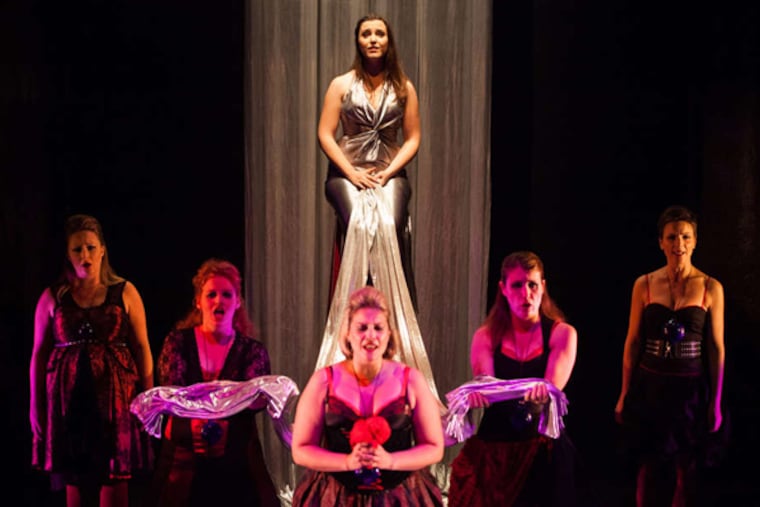'Svadba,' a singing Serbian celebration
The language couldn't be more foreign; the music's tightly wound harmonies don't conform to typical notions of beauty. Yet there's nothing mysterious, obscure, or less than infectious about Opera Philadelphia's Svadba (A Wedding).

The language couldn't be more foreign; the music's tightly wound harmonies don't conform to typical notions of beauty. Yet there's nothing mysterious, obscure, or less than infectious about Opera Philadelphia's Svadba (A Wedding), sung in Serbian and based on the piercing folk music of a place where people needed to be heard calling from one mountain to another.
The beauty of Svadba, at least at Saturday's opening in the new FringeArts building, lay in its unguarded, uninhibited, often-exuberant humanity. The hour-long work, which launches Opera Philadelphia's Opera in the City series, offers a keyhole peek at the night before a Balkan wedding.
Six sassy, busty, modern women - the bride and her attendants - gossip, play games, lament, and say goodbye while in near-constant motion, singing with virtually no accompaniment. Though a cappella opera is a new-ish genre (I know of only two others), Svadba feels fully realized. Its score, by Montreal-based Ana Sokolovic, and its imported-from-Toronto production both are remarkable for creating a complete world with modest means. In contrast to Tan Dun's solemn, bells-and-whistles-laden Nu Shu: The Secret Language of Women, just given its U.S. premier by the Philadelphia Orchestra, Svadba is a low-tech, emotionally direct phenomenon.
The opening serves notice: The vocal style is nasal and all manner of vocal utterances are in store. Some might once have called the gathering a "hen party," and at times this sextet doesn't just sing but seems to imitate the sounds (and perhaps the manner) of playful domesticated pets.
Each singer has a standing lamp that's used for interesting lighting effects and even better stage pictures, augmented by six hanging strips of satinlike cloth in which the bride was eventually bathed and clothed. Character exposition doesn't exist. And aside from the bride, Milinca (sung by Jacqueline Woodley), the women display little individuality and don't bare their souls, aside from reflecting on a desire to marry a hero.
Musically, the score is comfortable for those familiar with the Bulgarian Womens Choir during its 1990s vogue. Sokolovic's restless sense of invention is full of personal touches. Chords constantly morph in purposeful ways. In the final 10 minutes, the bride sings a solo that feels like an emotional weather–vane, spinning from soulful to spiritual, evolving into a sustained, entrancing ensemble scene. Great music, this.
The singers are mostly from the opera's original 2011 production, by Toronto's now-defunct Queen of Puddings Music Theatre. Rarely does one see singers mesh so seamlessly as under Marie-Josée Chartier's direction. Given how seldom one is likely to encounter anything like this, I felt not just feel happy to have seen it, but lucky.
I could have done without the post-performance reception with Balkan food (I'm vegetarian), wedding cake (I'm hypoglycemic), and the West Philadelphia Orchestra (a Balkan band that's deafening indoors). But the new FringeArts space, a repurposed pumping station at Race Street and Columbus Boulevard, is a major addition to the city's cultural landscape. It's hard to imagine what other operas could be performed there. But Opera Philadelphia's current leadership is likely to think of something.
Svadba (A Wedding)
Music by Ana Sokolovic; music director, Dairine Ni Mheadhra; stage director, Marie-Josee Chartier; repetiteur and instrumentalist, John Hess.
Cast:
Milica . . . Jacqueline Woodley
Danica . . . Shannon Mercer
Lena . . . Laura Albino
Zora . . . Virginia Hatfield
Nada . . . Andrea Ludwig
Ljubica . . . Krisztina Szabo
7 p.m. Wednesday and Thursday, FringeArts, Race Street and Columbus Boulevard. Tickets: $69. operaphila.org